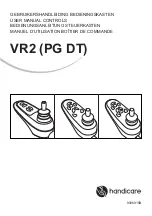
8.1.2. Units
A standard set of types/units has been adopted for use within Nuvation Energy BMS for the
measurements and configuration settings. Unless otherwise noted, the units used within the firmware
should be assumed as defined below.
Table 3. Standard Types and Units
Type
Units
Variable Type
Application
Address
none
uint32
BMS register address
Boolean
false=0, true=1
uint8
Logic value
Charge
mAh
int32
Depth of discharge and throughput
Count
number
uint32
A positive count of some event
Crc16
none
uint16
Used to verify persistent data
Current
mA
int32
Stack and pack currents
Energy
Wh
uint32
Energy capacity of a stack
Int64
value
int64
Signed 64 bit integer
ImpedanceMili
mΩ
uint32
Resistance of a stack
IpAddress
IP
uint32
IP4 address for a stack
LogLevel
none
uint32
Log level applied the BMS firmware
MicroOhms
μ
Ω
uint32
Resistance of a cell
Microseconds
μ
s
uint64
Time measurement or period
Percentage
%
uint8
Percentage of a full scale value (e.g. SoC)
PowerW
W
int32
Rated power of a stack
SoftwareId
enum
uint32
Enumeration for type of Cell Interface
Temperature
°C
int16
Thermistor temperatures
String
none
char[8]
Storage for 8 characters
UInt16
value
uint16
Unsigned 16 bit integer
UInt64
value
uint64
Unsigned 64 bit integer
Voltage
mV
int32
Cell and stack voltages
Every register within the firmware has an associated type that defines the expected units for that
register.
A negative value for
Current
and
Charge
represents a charge direction while a
positive value represents a discharge direction with respect to the cell/stack.
8.1.3. Storage Types
Each register in Nuvation Energy BMS can be one of five storage types.
Volatile
▪
Data that is not persisted across a system reset
Configuration
▪
Data that is persisted when requested and is typically set in field
Nuvation Energy Battery Control Panel - Product Manual
Document ID: NE-PM-005
67
Rev 1.1, 2020-10-14
Curie Update 2
















































